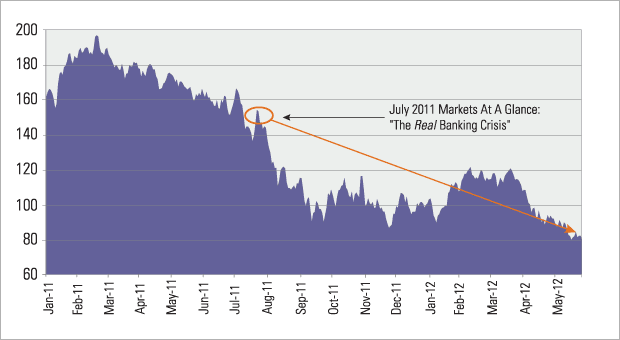by Eric Sprott and David Baker, Sprott Asset Management
Here we go again. Back in July 2011 we wrote an article entitled "The Real Banking Crisis" where we discussed the increasing instability of the Eurozone banks suffering from depositor bank runs. Since that time (and two LTRO infusions and numerous bailouts later), Eurozone banks, as represented by the Euro Stoxx Banks Index, have fallen more than 50% from their July 2011 levels and are now in the midst of yet another breakdown led by the abysmal situation currently unfolding in Greece and Spain.
EURO STOXX BANKS INDEX

Source: Bloomberg
On Wednesday, May 16th, it was reported that Greek depositors withdrew as much as €1.2 billion from their local Greek banks on the preceding Monday and Tuesday alone, representing 0.75% of total deposits.1 Reports suggest that as much as €700 million was withdrawn the week before. Greek depositors have now withdrawn €3 billion from their banking system since the country's elections on May 6th, seemingly emptying what was left of the liquidity remaining within the Greek banking system.2 According to Reuters, the Greek banks had already collectively borrowed €73.4 billion from the ECB and €54 billion from the Bank of Greece as of the end of January 2012 - which is equivalent to approximately 77% of the Greek banking system's €165 billion in household and business deposits held at the end of March.3 The recent escalation in withdrawals has forced the Greek banks to draw on an €18 billion emergency fund (released on May 28th), which if depleted, will leave the country with a cushion of a mere €3 billion.4 It's now down to the wire. Greece is essentially €21 billion away from a complete banking collapse, or alternatively, another large-scale bailout from the European Central Bank (ECB).
The way this is unfolding probably doesn't surprise anyone, but the time it has taken for the remaining Greek depositors to withdraw their money is certainly perplexing to us. Official records suggest that the Greek banks only lost a third of their deposits between January 2010 and March 2012, which begs the question of why the Greek banks have had to borrow so much capital from the ECB in the meantime.5 Nonetheless, we are finally past the tipping point where Greek depositors have had enough, and the past two weeks have perfectly illustrated how quickly a determined bank run can propel a country back into crisis mode. The numbers above suggest there really isn't much of a banking system left in Greece at all, and at this point no sane person or corporation would willingly continue to hold deposits within a Greek bank unless they had no other choice.
The fact remains that here we are, in May 2012, and Greece is right back in the exact same predicament it was in before its March 2012 bailout. Before the bailout, Greece had approximately €368 billion of debt outstanding, and its government bond yields were trading above 35%.6 On March 9th, the authorities arranged for private investors to forgive more than €100 billion of that debt, and launched a €130 billion rescue package that prompted Nicolas Sarkozy to exclaim that the Greek debt crisis had finally been solved.7 Today, a mere two months later, Greece is back up to almost €400 billion in total debt outstanding (more than it had pre-bailout), and its sovereign bond yields are back above 29%. It's as if the March bailout never happened… and if you remember, that lauded Greek bailout back in March represented the largest sovereign restructuring in history. It is now safe to assume that that record will be surpassed in short order. It's either that, or Greece is out of the Eurozone and back on the drachma - hence the renewed bank run among Greek depositors.
Meanwhile, in Spain, bank depositors have been pulling money out of the recently nationalized Bankia bank, which is the fourth largest bank in the country. Depositors reportedly withdrew €1 billion during the week of May 7th alone, prompting shares of Bankia to fall 29% in one day.8 The Bankia run coincided with Moody's issuance of a sweeping downgrade of 16 Spanish banks, a move that was prompted over concerns related to the Spanish banks' €300+ billion exposure to domestic real estate loans, half of which are believed to be delinquent.9 The Spanish authorities were quick to deny the Bankia run, with Fernando Jiménez Latorre, secretary of state for the economy stating, "It is not true that there has been an exit of deposits at this time from Bankia… there is no concern about a possible flight of deposits, as there is no reason for it."10 Funny then that the Spanish government had to promptly launch a €9 billion bailout for Bankia the following Wednesday, May 24th, an amount which has since increased to a total of €19 billion to fund the ailing bank.11 Deny, deny some more… panic, inject capital - this is the typical government approach to bank runs, but the bailouts are happening faster now, and the numbers are getting larger.
The recent bank runs in Greece and Spain are part of a broader trend that has been building for months now. Foreign depositors in the peripheral EU countries are understandably nervous and have been steadily lowering their exposure to Eurozone sovereign debt. According to JPMorgan analysts, approximately €200 billion of Italian government bonds and €80 billion of Spanish bonds have been sold by foreign investors over the past nine months, representing more than 10% of each market.12 The same can be said for foreign deposits in those countries. Citi's credit strategist Matt King recently reported that, "in Greece, Ireland, and Portugal, foreign deposits have fallen by an average of 52%, and foreign government bond holdings by an average of 33%, from their peaks."13 Spain and Italy are not immune either, with Spain having suffered €100 billion in outflows since the middle of last year (certainly more now), and Italy having lost €230 billion, representing roughly 15% of its GDP.14









